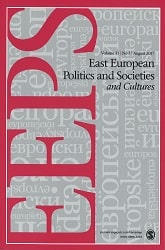Persistent Legacies of the Empires: Partition of Poland and Electoral Turnout
Persistent Legacies of the Empires: Partition of Poland and Electoral Turnout
Author(s): Piotr Zagórski, Radosław MarkowskiSubject(s): Political history, Government/Political systems, Electoral systems, Political behavior, Politics and religion, Politics and society, Behaviorism, 19th Century, Pre-WW I & WW I (1900 -1919), Transformation Period (1990 - 2010), Present Times (2010 - today)
Published by: SAGE Publications Ltd
Keywords: electoral turnout; political legacies; Habsburg Empire; Poland; partition;
Summary/Abstract: During the long nineteenth century, Poland was divided among the Russian, Habsburg, and Prussian empires. The partition produced regional diversity in political culture and in institutional and economic development. We examine how the cultural legacies of the empires have influenced the propensity of Poles to cast a ballot in parliamentary elections since 1989. Polish National Election Study individual-level data are used to assess whether higher levels of electoral turnout in Galicia are indeed a legacy of the Habsburg rule. Our results confirm that, even after controlling for socio-demographic factors, there is a positive, substantive, and significant effect on turnout of living in the ex-Habsburg part of Poland. This effect can be explained by the frequency of religious service attendance and by ideology. Inhabitants of Galicia not only attend religious services more frequently and are more conservative than their counterparts in the rest of Poland, but also the more frequently they attend church and the closer to the radical right they place themselves, the more mobilized they are to vote. The impact of the legacies of the empires on political behavior in Poland seems persistent.
Journal: East European Politics and Societies
- Issue Year: 35/2021
- Issue No: 02
- Page Range: 336-362
- Page Count: 27
- Language: English
- Content File-PDF

